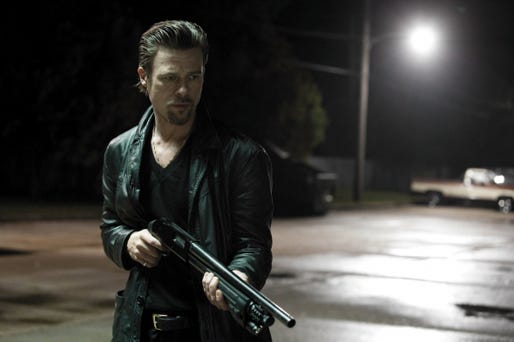Killing Them Softly

“Killing Them Softly” is a stylishly scuzzy, socioeconomic slog through the sludgy lives of hoods living in a gutted, gray, overgrown New Orleans. They’re not low-level criminals. They’re sewer-level. And writer-director Andrew Dominik’s approach may send some running for their fucking shine box and “Goodfellas” DVDs.
Its rudimentary plot — Jackie, a hitman (Brad Pitt), hunts down those responsible for a backroom poker-game holdup — is barely enough for one act, let alone three. So Dominik tries to hold up this particular mob as a microcosm of America’s economical and spiritual malaise circa 2008’s election season.
Largely absent, though, is the spellbinding scenarist behind “The Assassination of Jesse James by the Coward Robert Ford,” Dominik’s languid, beguiling meditation on mythmaking (also starring Pitt). Grafting social commentary onto a genre with often played-out surface pleasures isn’t the bad idea. It’s doing so with all the subtlety of piano wire around the throat.
Set aside the intermittently eye-rolling, on-the-nose dialogue like “This country is fucked” or “This world is just shit.” Dominik’s greatest offense is not entrusting his context of choice to either his directorial aptitude for tension or his expert cast.
Alongside Pitt, the film features James Gandolfini, Richard Jenkins, Ray Liotta, Ben Mendelsohn (of the great “Animal Kingdom”) and Scoot McNairy (utterly transformed from “Argo’s” nebbish Canadian diplomat into a genetic mix of Giovanni Ribisi and Casey Affleck).
But for all those heavy-hitters, the soundtrack’s first voice belongs to President Barack Obama, in a stump-speech sound bite sliced and diced over the film’s title. For example, Obama says, “Now is America’s chance to” before the screen slams to the word “KILLING.” We see billboards for Obama and Sen. John McCain before meeting at-odds characters named Barry and, no shock for a mob movie, Johnny.
And in Dominik’s ultimate screenwriter fantasy, these greasy-haired thugs don’t just watch President George W. Bush address the nation’s economic concerns on TV. They listen to him on the radio en route to their next violent beatdown.
“This is an extraordinary period for America’s economy,” Bush says on TV, as recently sprung cellmates Frankie (McNairy) and Russell (Mendelsohn) pilfer poker players’ pockets. They’re wielding a shotgun so sawed-off it looks like a garden-hose attachment and wearing stockings that smush their faces into humanoid shapes.
It’s one of many unnerving moments undercut by cheap audio cues, including the use of the Velvet Underground’s “Heroin” as Russell shoots up from a big score. (To Mendelsohn’s credit, you can feel the drugs sweating from the dirty pores of a man whose aim-low goals are scoring a fix and a gender-optional sex hole.)
Later, from a car radio, Bush bleats, “There must be consequences.” Moments later, we’re treated to the sight of Trattman (Ray Liotta), the poker game’s manager, vomiting the blood he’s been made to swallow. To Dominik’s credit, this over-cranked violence feels like the most unnerving thing that’s ever happened to Liotta in a movie, and he’s played a character forced to eat his own brains.
At least Pitt isn’t explicitly identified as the stimulus package for this specific economy — hired by Jenkins’s middleman to flush out Russell, Frankie and their protector, Johnny (Vincent Curatola, who played Johnny “Sack” on “The Sopranos”), so the poker racket doesn’t become open season for any punk with a gun.
To Jackie, beatings such as those given to Trattman are pointless wastes of time. He knows murder is the only message that matters and bristles at Jenkins’s reservations about employing the skills for which they’ve brought him to N’awlins. Once unleashed, Pitt excels at playing Jackie as a silver-tongued beast — perhaps the devil himself, given tossed-off references to how few have ever truly seen him — and shares a scene of fascinating, fatalistic nastiness with McNairy in a dive bar.
Pitt also nimbly trades barbs with Gandolfini, who gives his best in-person performance in a film since the last time the two co-starred together (in 2001’s “The Mexican”). He’s in full-brute mode as Mickey, Jackie’s alcoholic, washed-up former partner who’s facing jail time and treating this job like one last bender on the company dime.
Gandolfini shows Mickey’s spirit melt as quickly as the ice clinking in his tumbler. And his gloriously fetid cringe comedy takes quick, dark turns — suggesting Gandolfini’s woman-beating lackey from “True Romance” with no pilot light left.
But the movie unceremoniously casts Mickey aside to get back to the thesis statement. And Pitt spits, to nasty and verbally violent perfection, Dominik’s final assessment of America today. Were it but the apex of social speechifying and not a ladle of overkill atop election-night footage of Obama’s ’08 victory.
“Softly” too often feels like a referendum on Pitt’s disappointment in the president’s administration, much as pal George Clooney’s “The Ides of March” attempted in 2011. Unlike “Ides,” “Softly” strains toward Saying Something Big about political bread and circus as a distraction from lions that may devour us all. Its ambitions are admirable, but it lacks the cartilage-splintering punches it thinks it's throwing.


